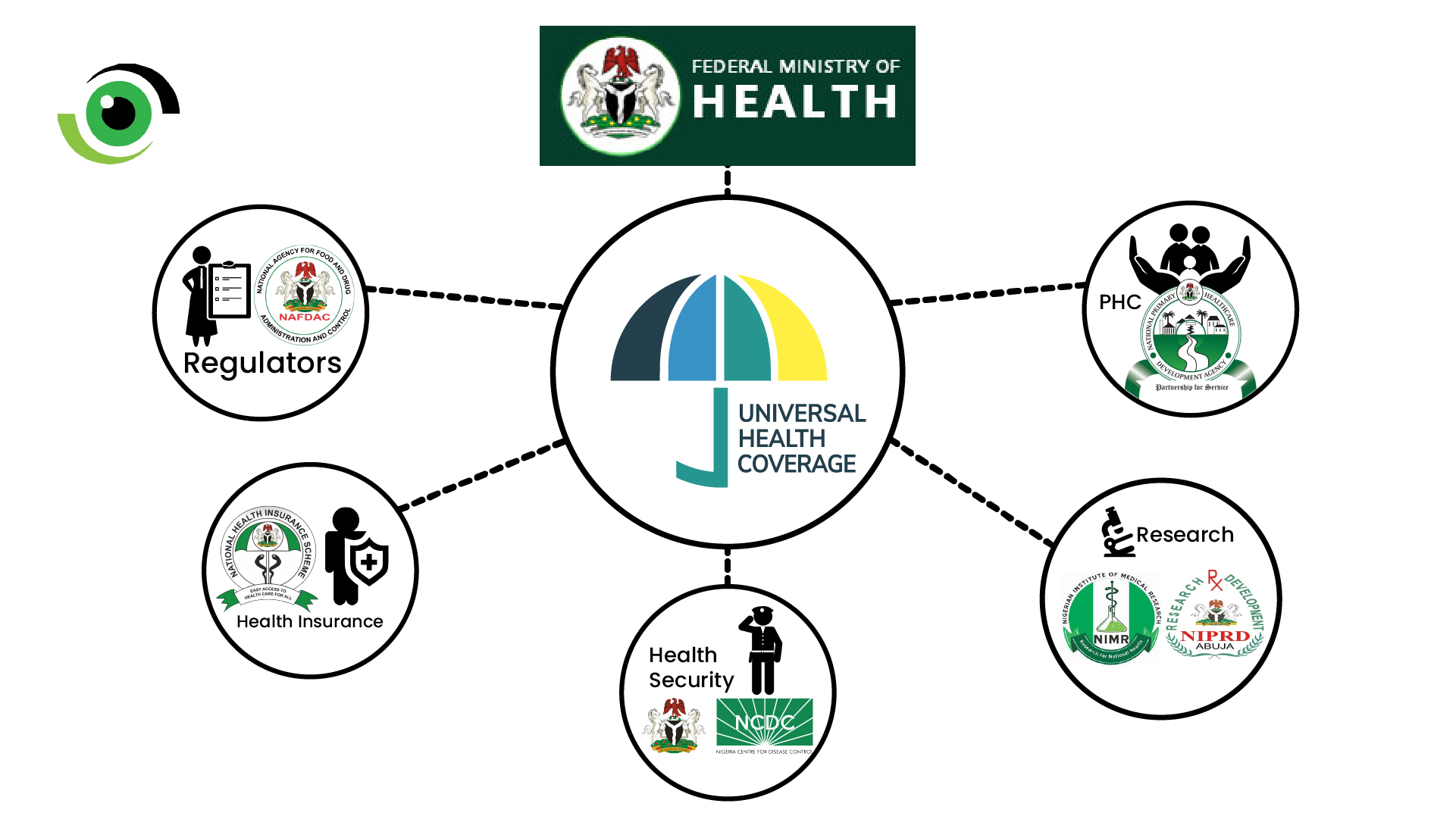By Aloysius Ugwu & Michael Atima (Lead Writers)
When the Director General of the World Health Organisation (WHO), Dr. Tedros Adhanom, said “Without health, people have nothing; without health, we have nothing as humanity”, he meant a world where everyone can achieve healthy and productive lives no matter who they are or where they live.
On December 7, 2020, the Federal Ministry of Health (FMOH) brought the media and other stakeholders together to inform Nigerians what it is doing to achieve the health agenda of President Muhammadu Buhari’s administration, which is to improve and provide better health services to Nigerians. The meeting highlighted the Federal Government’s health sector achievements in the last five years, as well as what Nigerians should expect from the 2021 road map.
The FMOH coordinates, manages and oversees the overall healthcare system in the country through structured systems which comprise of departments, programmes and agencies in collaboration with health systems of states and local governments, and support from relevant stakeholders. In his opening remarks, the Honourable Minister of Health, Dr Osagie Ehanire reiterated that the mission of the Federal Ministry of Health is “to build a health system that guarantees availability of universal access to appropriate, equitable, comprehensive, affordable, efficient and quality healthcare for Nigerians”.
The President has in his second tenure, set a nine-point health sector next level agenda that should propel the country towards the attainment of Universal Health Coverage (UHC), which means that “all individuals and communities receive the health services they need without suffering financial hardship”. The COVID-19 pandemic has exposed the fragility of human health, and during the media briefing, Honourable Minister of Health mentioned that the “COVID-19 outbreak offers an opportunity to restructure, or even rebuild health systems”.The media briefing was an opportunity to share plans and aspirations of the Ministry of Health as outlined in the National Strategy Health Development Plan II (NSHDP II), and the President’s “Health Sector Next Level Agenda of 2019”, a nine point media plan was conceptualized as a step towards UHC in Nigeria.
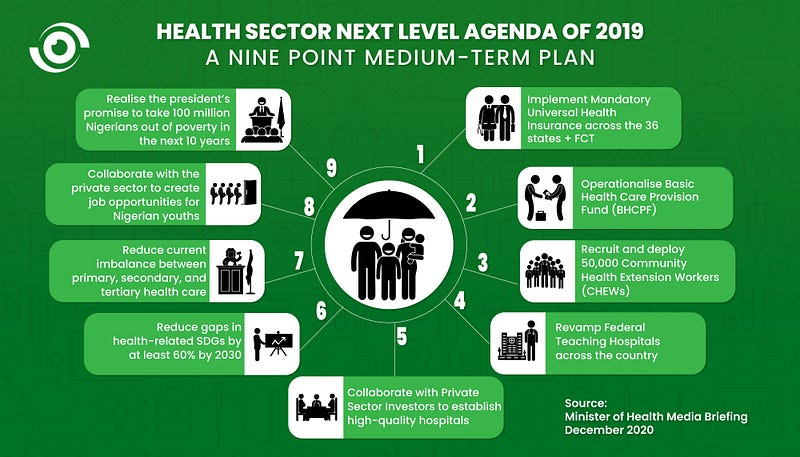
Ministries, Departments and Agencies under the supervision of the Federal Ministry of Health are integral to achieving the health sector next level agenda. Their roles are summarized below:
National Primary Health Care Development Agency
The National Primary Healthcare Development Agency (NPHCDA) works to ensure that Primary Health Care (PHC) services are available and accessible to all in Nigeria. PHC has been ascribed as the most efficient and cost-effective approach to achieving Universal Health Coverage (UHC). However, the current primary healthcare system in Nigeria is under-utilized with a significant burden transferred to the secondary and tertiary health systems. The Executive Director of the NPHCDA, Dr. Faisal Shuaib, said during the media engagement that the PHC which is expected to provide quality healthcare services for at least 70% Nigerians currently carters for about 20%, while the bulk of the population are overwhelming using secondary and tertiary care.
Over the years the Nigerian health system has faced very poor health outcomes. Nigeria’s maternal mortality rate is 512 per 100,000 live births according to the 2018 Nigeria Demographic and Health Survey, infant mortality rate is 67 per 1,000 live births and the under 5 mortality rate is 132 per 1,000 live births. The primary health care facilities are operating at different levels of functionality with shortages of critical human resources. Supply of medical commodities are poor with continued stock outs in health facilities.
Despite these challenges the NPHCDA has made significant progress in the last few years. In August 2020, Nigeria was certified polio virus free. Immunisation coverage increased from 33% in 2016 to 71% in 2019. The agency has supported initiatives to reduce the impact of COVID-19 in Nigeria, ranging from training over 220,000 health workers and community volunteers at the national and state levels, instituting a command center to work collaboratively with the Nigeria Centre for Disease (NCDC) and other stakeholders at all levels of government, and supporting the procurement and distribution of personal protective equipment (PPE) to health care workers.
Looking forward to the next 10 years, the NPHCDA has planned to work with the states, local government areas (LGAs) and other critical stakeholders to deploy a four-point agenda to fast track progress towards achieving UHC. This agenda is highlighted below:
- PHC Revitalization and Human Resource for Health: There are about 33,000 PHCs in Nigeria which is at different levels of functionality. The NPHCDA plans to revitalize these PHCs as well as optimize human resources for health to improve services. There are efforts to explore other funding sources for PHC services.
- Improved Technology for PHC data, services and vaccine distribution: The use of technology to improve healthcare service delivery has become imperative. In the coming years, NPHCDA will leverage technology to strengthen data management, supply chain and remote access to health services in order to achieve equitable and increased coverage of traditional and new vaccines. Some of these technologies would include telemedicine and use of drones.
- Social and Behavioral Change Communication: There is significant low demand for healthcare especially at the primary healthcare level. There is need to scale up health promotion, behavioral change communication and demand for primary healthcare services. This will be implemented by scaling up the CHIPS programme across the nation.
- Post-Polio PHC System Strengthening: With the eradication of Poliomyelitis in Nigeria, there is a wealth of resources and experience deployed in achieving this success. The Agency plans to strengthen the PHC system by harnessing these resources and experiences to improve maternal and child health.
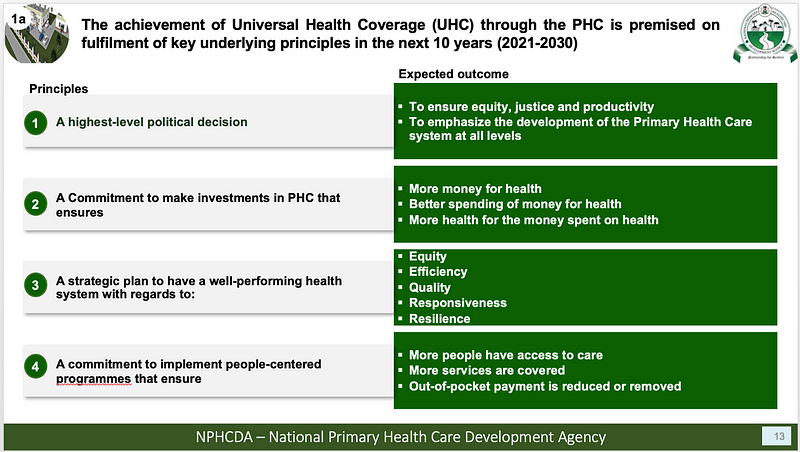
The National Health Insurance Scheme (NHIS)
In 2018, an independent fact-finding panel was constituted to analyse the prevailing challenges of the National Health Insurance Scheme. These challenges range from internal disharmony, high turnover of CEOs, and low levels of coverage across the nation, amongst others. The recommendations of the panel resulted in a change in leadership, dissolution of the governing council of the scheme, and operationalisation of ten presidential action points, which was reported at the meeting to be 80% completed.
The new scheme is anchored on a three-point rebranding agenda which includes:
- Restoring a value system that will transform NHIS into a credible result-driven organization.
- Engendering transparency and accountability in the entire operations of the scheme
- Accelerating the drive towards achieving universal access to quality healthcare for all Nigerians
Recently, NHIS launched the National Health Insurance Scheme Under One Roof which is an initiative for effective integration and coordination of health insurance activities in Nigeria towards the attainment of Universal Health Coverage in Nigeria.
Moving ahead towards achieving UHC, the NHIS is accelerating efforts towards the amendment of its Act to make health insurance mandatory for all Nigerians, operationalise the e-NHIS platform, secure political support for UHC at all levels of governance, focus on domestic and sustainable innovative financing, and expand its stakeholder engagement.
The National Agency for Food and Drug Administration and Control (NAFDAC)
The National Agency for Food and Drug Administration and Control was established in 1993 to regulate and control the manufacture, importation, exportation, distribution, advertisement, sale and use of Food, Drugs, Cosmetics, Medical Devices, Packaged Water, Chemicals and Detergents.
The mission of NAFDAC is to safeguard public health by ensuring that only the right quality drugs, food and other regulated products are manufactured, imported, distributed, advertised, sold and used in Nigeria.
To ensure access to quality assured products to support Universal Health Coverage (UHC), NAFDAC deployed strategies which include; building regulatory capacity and competencies in various areas of medicines, optimising digital e-registration platforms for an improved regulatory process, increased remote functionality, and implementation of a robust procedure for the regulation and control of chemical manufacturing in Nigeria.
The Nigeria Centre for Disease Control (NCDC)
NCDC’s core mandate is to detect, investigate, prevent and control diseases of national and international public health importance. The institution’s operation is guided by the 2017–2022 NSHDP II and the National Action Plan on Health Security.
In the past five years, the NCDC has made significant progress across six pillars of its operations which include governance and leadership, emergency preparedness and response, disease prevention and promotion, disease surveillance and epidemiology, public health laboratory services, and workforce development. Notable is the 2018 final assent for the Bill for an Act to establish the NCDC by President Buhari. This provided NCDC with the mandate to be the national coordination centre responsible for preventing, detecting and responding to infectious disease outbreaks. This led to the establishment of Emergency Operation Centres at the state level, training of rapid response team in all states, accreditation of laboratories across the states, and the rehabilitation of the NCDC National Reference Laboratory. Through NCDC’s efforts, the country has moved from 39% in 2017 to 46% in the 2019 mid-term Joint External Evaluation.
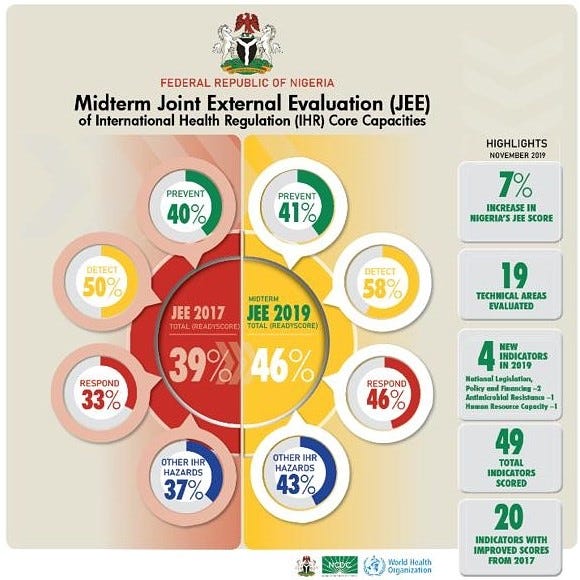
To achieve UHC, NCDC has mapped out a new health security architecture to prevent, detect and respond to public health emergencies through the following approach:
- Stronger health security at sub-national level–EOC network, lab networks, and surveillance system.
- Improved One Health approach for disease prevention, detection and response
- Stronger coordination and collaboration across sectors, government levels, and partners
- Stable, substantial and sustainable funding for health security
- Better preparedness for the next pandemic.
National Institute for Pharmaceutical Research and Development
The National Institute for Pharmaceutical Research and Development (NIPRD) works in collaboration with close to 50 MDAs, 8 federal universities and over 15 embassies, high commissions and diplomatic missions within Nigeria, and over 10 international development partners. The primary objective of the institute is to conduct research to improve pharmaceutical raw materials, drugs and biological products. The mission of the institute is to apply modern science and technology to increase local production of drugs, by effective collaboration with the industry and experts, who are within and outside Nigeria, provide assurance of quality on all the drugs used in healthcare and develop quality standards for phytomedicine.
The quality of health care services is critical to achieving effective universal health coverage, and NIPRD is working to ensure that quality of medicines are a top priority in Nigeria.
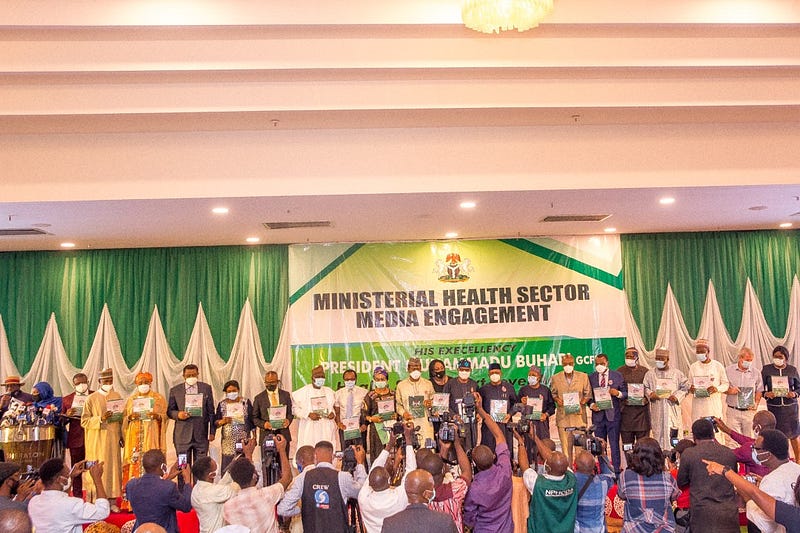
It is important that Nigerians understand the different components of the health system and how they are working to improve health, so they know what structures are available how to hold different aspects of government accountable. Achieving UHC in Nigeria requires the effort of all key stakeholders to complement the efforts of the Federal Ministry of Health and her various agencies.
The National Health Act (2014) established the BHCPF as one of the key drivers to attaining equitable health for all in Nigeria. It is hoped that the revised Basic Health Care Provision Fund (BHCPF) implementation guideline launched at the media engagement event will set in motion the mechanism to fast track the achievement of UHC for all. At present, efforts towards UHC have not been enough, the COVID-19 pandemic exposed the fragility of our health systems in Nigeria and globally. We are only as strong as our weakest link and Nigerians deserve UHC and universal protection at their point of need.


